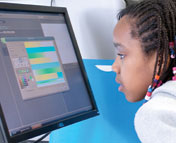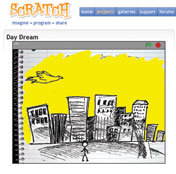Bringing STEM Skills up to Scratch
- George Stockman
- Professor
- Department of Computer Science and Engineering
- College of Engineering


Learning about computer programming the fun way.
From the way George Stockman bustled about the computer lab, you would have thought he had nothing on his mind but tutoring the dozen or so middle-schoolers whose programming projects were displayed at workstations around the room. In fact Dr. Stockman, a professor of computer science and engineering, was also pursuing a long-term interest in how kids learn science, technology, engineering, and math (STEM) skills. "We're jointly creating a curriculum here, integrating math and computer concepts," he said. "Between the experienced teachers and the receptive kids, we're working on methods before we scale it up."
"The kids are working with Scratch," explained Stockman. "It's a fun program they can use to create and mix music, animations, and video. At the same time they're learning about basic computer concepts and object-oriented programming. The program is free. Anyone can download it from MIT."
The class is offered through Lansing's Information Technology Empowerment Center (ITEC). ITEC grew out of a collaborative effort among local business, government, nonprofit, and education partners. Stockman chairs its board of directors. ITEC offers free and low-cost afterschool programs—like the one Stockman was tutoring at St. Stephens Community Church on Lansing's eastside—designed to get kids excited about science and math.
According to ITEC executive director Kirk Riley, "It shouldn't be just more regular school and it should be fun." And these kids were definitely having fun. One was making a small cartoon character dance and change color; another was figuring out how to add music to a video. Stockman was having fun right along with them, admiring the cartoon character's antics and intoning vocals into a microphone as the young multimedia artist fiddled with various controls. Other ITEC volunteers— MSU students Meryl Mabin, Ed Corcoran, and James Salehi— also moved around the room, assisting as needed.

Pat Barnes-McConnell and George Stockman with Scratch class.
Stockman believes that one major factor in the program's success is parental engagement. "The home-schooled students actually do very well," he said. "Their parents are all very engaged. They value what we're doing." Another is staffing: "We have a staff of four for 14 to 18 kids. It makes a huge difference. It's easier to see if somebody's getting lost." Support from the community partners who host classes is important too: "Kids need snacks, exercises. They need to get up and move around." He is also pleased with the involvement of MSU undergraduate interns. "They're creating some great materials. They look at things in a whole new way," he said.
"We're jointly creating a curriculum here, integrating math and computer concepts. Between the experienced teachers and the receptive kids, we're working on methods before we scale it up."
George Stockman
He points out, with pride, the creativity and resourcefulness of both the individual and the organizational partners who keep the project afloat: "Pat Barnes-McConnell is a retired MSU professor of Resource Development. Her church got a grant and bought some computers, and they're hosting this class at St. Stephens. Eugene Cain, the Chief School Administrator of Shabazz Academy, is a member of her church, so now the Shabazz kids go to the St. Stephens sessions. TechSmith is working with Impression 5 to put on a week-long camp at the science center. We'd really like it if I-5 could become a locus for Lego robotics competitions and Scratch workshops."
"MSU undergrad interns are creating some great materials. They look at things in a whole new way."
George Stockman
Dr. Cain echoed the enthusiasm and energy surrounding the project. "George is wonderful. Our children really look forward to the program. I wish I could have given them more time with him," he said. "Technology is a more serious activity to them now. They are seeing a new aspect of computers. You can use them to create—games, animations— from your own mind."
The partners in this venture are committed to the long term. "We want to become a permanent expectation, so kids can look forward to an ITEC activity," said Stockman. "But people have to value the effort it takes to get that. It makes no sense that high schools in MSU's shadows are failing." Other educators may blame the urban environment for this failure, but Stockman doesn't think so. "An isolated rural area can be just as bad," he said. "The gap is between individual schools in the communities. It's about your community."
- Written by Linda Chapel Jackson, University Outreach and Engagement